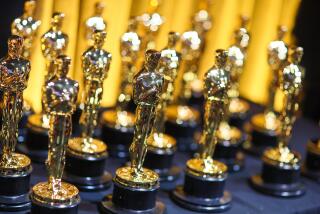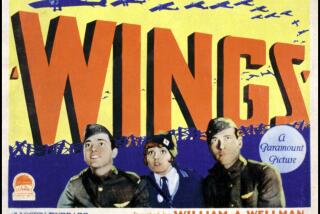Column: Oscars 2015: Indie outside shot ‘Whiplash’ keeps hitting the mark
From the very first, “Whiplash” has survived and thrived by being the different drummer — philosophically, metaphorically, literally. It’s a $3.3-million indie outside shot that somehow keeps hitting the mark. Now it’s got five Oscar nominations in its pocket.
For an unsparingly tough movie about an aspiring jazz drummer’s drive to be great, the journey began a year ago with a shock. At Sundance, where “Whiplash” premiered and producers wondered whether they could sell it, the film closed out the festival with two priceless wins — the audience award and the grand jury prize. The embrace of both filmgoers and peers, the perfect one-two punch. It’s a trend that has continued, moviegoers showing up and generating a solid box office for a small film, $6.1 million to date, and movie guilds showing respect.
And on Thursday, the film academy weighed in, officially certifying “Whiplash” as a serious contender.
Oscars 2015: List | Top nominees | Reactions | Snubs/surprises | Live updates | Full coverage
In the running for best picture; supporting actor for J.K. Simmons’ portrayal of a sadistic professor relentless in pushing for perfection; adapted screenplay for writer-director Damien Chazelle’s brilliant expansion of his modest short; editing by Tom Cross, who mastered the sticks as much as actor Miles Teller, who played Andrew, the budding drumming genius at the film’s center; and sound mixing by Craig Mann, Ben Wilkins and Thomas Curley for getting every bada boom just right.
Simmons, a veteran character actor who has spent a lifetime in the trenches, is a popular front-runner. The Oscar nomination, his first, is no doubt the ultimate birthday present, coming just a few days after he celebrated his 60th.
The actor has been charming everyone with his graciousness in one interview after another. He refers to Chazelle, the shy, self-deprecating mastermind of this incisive cut at passion, ambition and obsession as the “boy wonder.” Chazelle celebrates his own birthday milestone on Monday when he turns 30.
Teller is the other “boy wonder” in Simmons’ book. The 27-year-old’s performance, visceral and astonishing, has also been critically praised, but the awards have passed him by this time.
Chazelle’s very contemporary look at ambition, artistry and the American way with it is infused with the same sort of brash intensity and modern sensibility that helped propel Darren Aronofsky’s brutal ballet story, “Black Swan,” to its five Oscar nominations in 2011. The film’s one win went to Natalie Portman, for her devastating, deconstructing swan.
Like “Black Swan,” one of the distinctions of “Whiplash” is the way it splits the vote — moviegoers either love it or hate its rawness. But those who love it, love it deeply and unconditionally. Many of its supporters are among the sharp, young, hip set.
Oscars 2015: Pundits’ picks | Timeline | Celebrity photos | Full coverage
I find it especially heartening that the same generation that has a seemingly insatiable taste for tasteless R-rated comedies has been drawn to a film so philosophically and emotionally challenging.
One of the appeals of “Whiplash” to millennials, no doubt, is the lack of sentimentality in this coming-of-age saga. It constructs this around Andrew’s desire to excel, so much so that he at first submits, essentially taking anything his revered and feared master dishes out. By the end, the artistry overtakes all else, the boy becomes a man, and the man finds a voice that overpowers and silences his tormentor.
Capturing that rebellion, and the final overthrow, in a stunning drum solo that is one of the show-stopping feats for the sound mixers and the film editor, played like a generational win. In “Whiplash,” the baton is not so much passed as seized.
A word or two about Chazelle. You can feel the emotion that went into building each scene, the filmmaker’s personal experiences as an aspiring jazz drummer himself poured onto the pages that became the script the academy has honored.
Like his movie, Chazelle seemed to come out of nowhere. In truth, the filmmaker’s been working his way toward “Whiplash” for a while. His first movie, 2009’s “Guy and Madeline on a Park Bench,” looked at the intersection of music and passion via a jazz trumpeter’s romantic conflicts. “Whiplash,” the short, picked up the thread, a trumpeter once again the central figure. No drums yet.
Which is why the full-length movie receives consideration as an adaptation. The film stands, in a sense, as a confessional — of a student, of a genius, of an artist, of a generation that does not always know what it wants, but wants it very badly. That roil of emotions and intellect is captured in every beat of that drum, every bloody minute bent on perfection that “Whiplash” portrays in excruciating detail. (Justin Hurwitz’s fine job overseeing the music was also bypassed by the academy.)
Whatever this long shot’s final tally when the awards season culminates on Oscar night, the accomplishment of “Whiplash” is in its connection. Moviegoers, enough of them, have seen it and embraced it. “Whiplash” will be remembered, regardless.
Twitter: @BetsySharkey
More to Read
Only good movies
Get the Indie Focus newsletter, Mark Olsen's weekly guide to the world of cinema.
You may occasionally receive promotional content from the Los Angeles Times.







